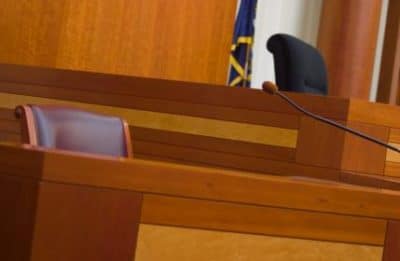
“Evidence given by a competent witness, under oath or affirmation” (Black’s Law Dictionary). “Evidence given under oath by a witness either at trial or in an affidavit or deposition” (Nolo’s Law Dictionary).
Example Sentence
Ms. Reed’s testimony included seeing Mr. Price driving dangerously right before the accident.
Case Study
Several people saw William’s accident and his attorney, Mr. Nelson, made sure that each witness came to court to give their testimony about what they saw. The police officer shared what he observed when he arrived on the scene. Two people testified of driving near the accident and shared how the truck driver swerved on the road several times before clipping William’s car. Finally, an expert testified about what happened with the accident based on skid marks, damage to the vehicles, and other information.
Other Important Information
Testimony usually refers to an oral statement made by a person at the actual court room. However, it can also refer to written evidence such as an affidavit or deposition. Testimony represents only one type of evidence that courts will admit. Other types include documents, videos, pictures, and other physical objects. Members of the jury and the judge have access to all of the evidence, including all testimony given in the case, when making their decision. The court places the witness under oath to only state the facts that they believe to be truthful and accurate. However, either side may hire expert witnesses to share their opinions about what happened. This may include doctors and people who reconstruct accidents. Sometimes, the court will subpoena a witness, meaning that the judge requires the witness to come to court to testify or else face a penalty. Also, the court will not allow second hand information (hearsay) as testimony, unless under special circumstance. So, a witness cannot testify of something that they did not personally observe. For example, a police officer cannot share that they heard John say that he heard something; the officer can only testify to what they heard or saw. Witnesses who lie in their testimony are guilty of perjury and can be put in jail. It is also a crime to pay the witness to lie in testimony. However a legal party may pay witnesses, such as experts, for their testimony because of the credibility it brings to the case. Sometimes uninsured drivers cause accidents, even involving multiple cars. In Utah, if an insured person was not directly impacted by the uninsured person who caused the accident, he or she will need more than just their own testimony as evidence that the other driver caused the accident. Jury members can determine how credible a witness’ testimony is by: 1) the way the person testifies, 2) the character of the witness or the testimony, 3) the motives of the witness, or 4) any contradictory evidence. Utah’s laws also gives many specifics about witnesses and their testimony.
Photo courtesy of Brad Shorr. The image is in the public domain.